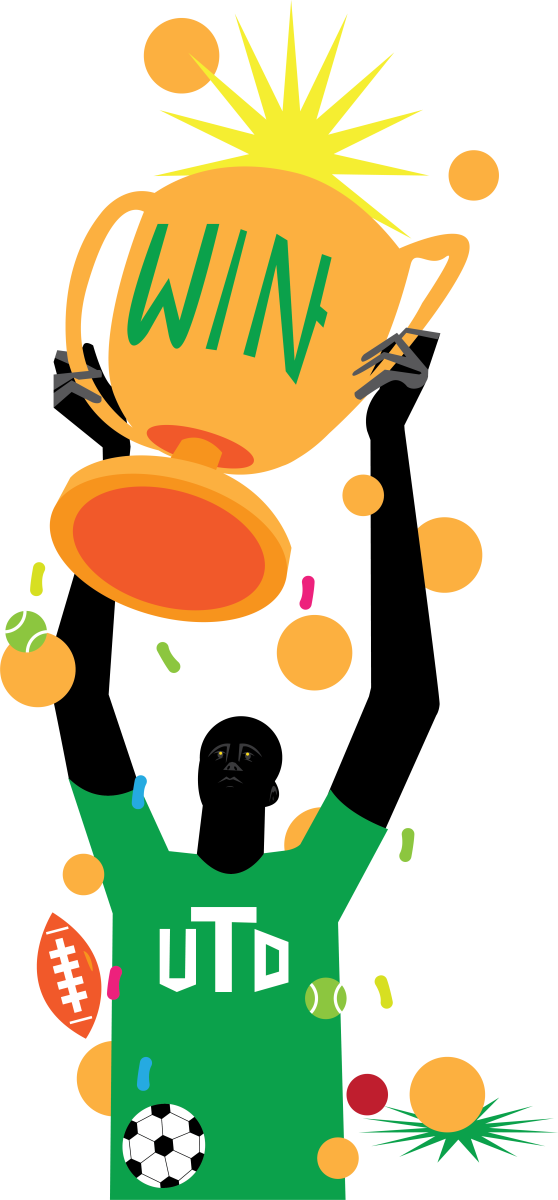Despite recent successes in academic fields, UTD faculty have expressed skepticism about our university’s burgeoning sports identity. But why see it as a binary choice? Academic excellence and a robust sports identity aren’t mutually exclusive; they complement each other.
In a video from the academic senate this summer, faculty voiced concerns and doubts about the expansion of sports on campus, namely that they might divert students’ attention from classes. However, The Mercury encourages all of its readers to think about the big picture: UTD is in an unprecedented era of growth. This isn’t just growth through new buildings like the revamped Student Union or new art hubs like the Athenaeum, but a seismic shift in where our university derives its identity on a national level. The recent transition to Division II sports paves the way for scholarships, enhanced sporting facilities and more competitive athletic programs. The new track and field complex — set to break ground next summer — will be open to all Comets, athlete or not. These upgrades to Athletics come alongside initiatives for semiconductor technology and a growing biomedical engineering research program with UT Southwestern. However, Athletics finally getting more recognition is not deterring academic or research pursuits — in fact, the same athletes out on our basketball courts and soccer fields are in those very labs.
“I’ve taken so much with me from basketball,” Kelden Pruitt, a doctorate student who played on UTD’s men’s basketball team as an undergraduate with two NCAA shows while working in bioimaging research and pursuing a biomedical engineering degree, said, “The biggest thing was the relationships you build. When you do something like practicing two to three hours a day, six days a week, and then you go on road trips and play games out of state, the bonding with the guys — the friendship — is indescribable. That’s what kept me around.”
Pruitt isn’t alone. The Mercury interviewed over 30 current and former UTD athletes this past summer and spring for various stories, who all expressed positive attitudes towards their sport and the impact it had in their lives. Participating in sports in college forces students to develop better time management skills as well as fostering life-long relationships, both personal and professional. As President Benson said in the academic senate video, most student athletes “tend to have higher GPA than the average population. They are more disciplined. They’re often times healthier.”
There’s a misconception that pouring funds into athletics comes at a cost to academics. But it isn’t a zero-sum game. Financial allocations towards sports come from unrestricted funds, a pool of money not designated towards any particular department. This means the university is not pulling from academic funds to finance sports. The academic sector is healthily financed with over $200 million and growing allocated to it this year, while for the same year, the Athletic department has a budget of less than $3 million. Thus, it is imperative that Athletics receive extra funding in order to maintain their current facilities and grow to support more student athletes. Added funding will allow Athletics to hire dedicated staff and operate more autonomously; given the unique life balance student athletes must strike, this staff expansion is crucial. And when it comes to scholarship funding, it’s important to remember that Division II athletes still have to meet the same academic standards for entry into the university as their peers before their sports scholarship can finance their education.
UTD’s transition to Division II sports will cultivate a well-rounded campus experience and attract a diverse cohort of students interested in research, esports, arts and more. Consider great institutions like Duke or Ohio State University. Their reputations are not built solely on academics or their strong basketball programs, but a combination of both. Students at these school juggle the demands of labs, lecture halls and sports arenas, embodying the multifaceted nature of a comprehensive educational experience. Likewise, UTD’s identity is grounded in multiple areas of campus, and it aims to expand its accomplishments across these departments like any forward-thinking university.
If there’s anything our campus could use more of, it’s community spirit. UTD was ranked in the top 10 most unhappy campuses by the Princeton Review in 2018, which was attributed to excessive solitude. But it doesn’t need to remain that way. Funding towards Student Affairs and a more vibrant sports culture fosters camaraderie, invigorates student life and offers a collective, shared experience; all opportunities for Comets to come together.
UTD’s nerdy identity isn’t going anywhere. So, to the skeptics: this September, take a Saturday off. Step out of the lab or away from the controller and immerse yourself in a basketball, soccer or volleyball game. Experience the thrill, the unity and the sheer joy of watching a live match, and you might come to appreciate what sports offer. Even the writers at The Mercury find themselves drawn to the games, where adrenaline and spirit are unparalleled.
It’s not about choosing academics over athletics or vice versa. It’s about embracing growth, celebrating diversity and realizing that UTD’s strength lies in its multifaceted identity.





